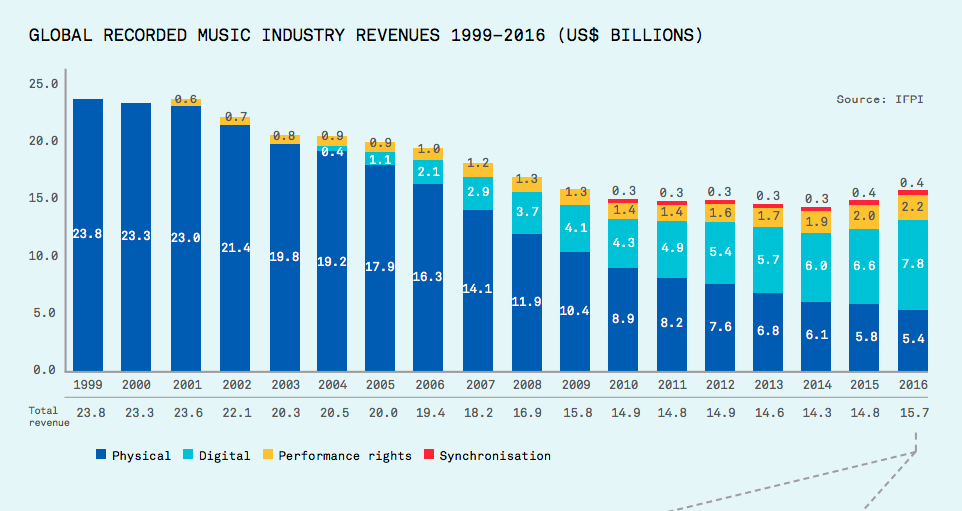The Music Industry And Its Value Gap
This is a short video I posted on The Moonlight Club's Facebook page. With my friends John & Frank, we've been working on an album project. This is a video teaser of the first song we'll release this week.
When I shared the video posted on my own Facebook page, I took the opportunity to ask my friends how they listen to music. Without any surprise, most of them use streaming services such as Spotify, Apple Music, Google Play or YouTube. Some mentioned being vinyl collectors.
This is quite consistent with what the stats found in the IFPI Global Music Report. More digital revenues. Less physical revenue. Better monetization of performance. More synchronization (selling songs to ad/commercial properties). Interesting fact: before seeing a return to growth in 2015, the global recording industry lost nearly 40% in revenues from 1999 to 2014!
source: IFPI
The most interesting thing in this report is without a doubt, what the IFPI calls The Value Gap. From publicly available data, IFPI estimates that Spotify paid record companies US$20 per user in 2015. By contrast, it is estimated that YouTube returned less than US$1 for each music user.
“The value gap describes the growing mismatch between the value that user upload services, such as YouTube, extract from music and the revenue returned to the music community – those who are creating and investing in music. The value gap is the biggest threat to the future sustainability of the music industry.”
When you read this, you think ' when we figure out how to extract that other 19$ from YouTube users, all artists will be rich!'. But you know by the time YouTube's revenue/user goes up, there will be a new platform that enlarges the value gap again. We want to look at graphs and see the bars growing year-over-year but I think digital music will always struggle at producing direct revenues for artists. Music is content. Content is consumed online. Online content (in general) has a hard time figuring out how to monetize itself. We're chasing our tails here.
I think the problem lies deeper. The music industry too many value gaps. There are many cases where artists provide value to an audience and are not compensated. Some industries are more efficient than others at capturing value. Maybe it is that artists are doomed.
Maybe it's just that the industry hasn't found the right way to capture the value it produces. Maybe the industry doesn't even understand what it's really selling if selling is still an objective.
Remember, Starbucks sells 5$ lattes to people who just want to hangout 1hr in a comfy sofa. Talk about capturing value. I think it's time to re-think value in the music industry. Ideas for that in another post!
